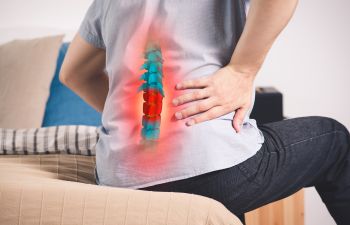
Discs are soft, rubbery pads found between the vertebrae in the spinal column. These discs allow the back to flex or bend, and they act as shock absorbers to protect the spinal column. As we age, our discs lose water content and become less flexible. The discs also begin to shrink, allowing the spaces between the vertebrae to get narrower and making it easier for the discs to weaken and become herniated. As the discs degenerates from age or trauma, the softer central portion of the disc can rupture (herniate) through the surrounding outer ring. This can cause extreme local pain at the site of the herniated disc in the spinal column.
Symptoms and Causes of a Herniated Disc
Like any other medical issue, it is important that you first recognize the possibility of disc herniation so that you can seek treatment or avoid certain activities.
The most common symptoms of a herniated disc include:
- Localized lower back pain
- Pain in the neck, arm, or leg
- Numbness, tingling, or a burning sensation in the part of the body that is served by the affected nerves
- Weakness that affects your ability to stand, walk, and lifting/holding objects
- Pain after sitting or standing for a long period of time, or after walking a short distance
Once you realize your disc herniation, it is common to question why or how it happened. The most common causes of a herniated disc include:
- Age and the natural degeneration of a disc
- The weakening or tearing of the outer rings, causing the inner ring of the disc to slip out (herniate)
- Certain body movements while turning or twisting
- Lifting heavy objects that put a strain on the lower back
Non-Surgical Treatment for Disc Herniation
We are proud to say that most cases of herniated discs find improvement with specific chiropractic, physical therapy, spinal decompression and active therapeutic rehab. Exercises that stretch and strengthen the lower back and the muscles surrounding it can do a great deal to help patients find relief from their symptoms. Spinal decompression involves stretching the spine using a traction table or motorized equipment with the aim of relieving symptoms associated with a herniated disc. Call Manhattan Sports Therapy today to learn more about our effective treatments for disc herniation relief.
Posted on behalf of
515 Madison Avenue FL 22A
New York, NY 10022
Phone: (212) 310-0100
Email: sportstherapy150@icloud.com


